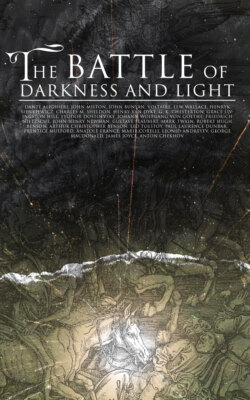Читать книгу The Battle of Darkness and Light - Джон Мильтон - Страница 140
На сайте Литреса книга снята с продажи.
II.
The Nose.
ОглавлениеTable of Contents
One morning Azora returned from a walk in a terrible passion and uttering the most violent exclamations.
"What aileth thee," said he, "my dear spouse? What is it that can thus have disturbed thee?"
"Alas!" said she, "thou wouldst have been as much enraged as I am, hadst thou seen what I have just beheld. I have been to comfort the young widow Cosrou, who, within these two days, hath raised a tomb to her young husband, near the rivulet that washes the skirts of this meadow. She vowed to heaven, in the bitterness of her grief, to remain at this tomb whilst the water of the rivulet should continue to run near it."
"Well," said Zadig, "she is an excellent woman, and loved her husband with the most sincere affection."
"Ah!" replied Azora, "didst thou but know in what she was employed when I went to wait upon her!"
"In what, pray tell me, beautiful Azora? Was she turning the course of the rivulet?"
Azora broke out into such long invectives, and loaded the young widow with such bitter reproaches, that Zadig was far from being pleased with this ostentation of virtue.
Zadig had a friend named Cador; one of those young men in whom his wife discovered more probity and merit than in others. He made him his confidant, and secured his fidelity as much as possible by a considerable present. Azora, having passed two days with a friend in the country, returned home on the third. The servants told her, with tears in their eyes, that her husband died suddenly the night before; that they were afraid to send her an account of this mournful event; and that they had just been depositing his corpse in the tomb of his ancestors, at the end of the garden. She wept, she tore her hair, and swore she would follow him to the grave. In the evening, Cador begged leave to wait upon her, and joined his tears with hers. Next day they wept less, and dined together. Cador told her, that his friend had left him the greater part of his estate; and that he should think himself extremely happy in sharing his fortune with her. The lady wept, fell into a passion, and at last became more mild and gentle. They sat longer at supper than at dinner. They now talked with greater confidence. Azora praised the deceased; but owned that he had many failings from which Cador was free.
During supper, Cador complained of a violent pain in his side. The lady, greatly concerned, and eager to serve him, caused all kinds of essences to be brought, with which she anointed him, to try if some of them might not possibly ease him of his pain. She lamented that the great Hermes was not still in Babylon. She even condescended to touch the side in which Cador felt such exquisite pain.
"Art thou subject to this cruel disorder?" said she to him, with a compassionate air.
"It sometimes brings me," replied Cador, "to the brink of the grave; and there is but one remedy that can give me relief—and that is, to apply to my side the nose of a man who is lately dead."
"A strange remedy, indeed!" said Azora.
"Not more strange," replied he, "than the satchels of Arnou, against the apoplexy."
This reason, added to the great merit of the young man, at last determined the lady.
"After all," says she, "when my husband shall cross the bridge Tchinavar in his journey to the other world, the angel Asrael will not refuse him a passage because his nose is a little shorter in the second life than it was in the first."
She then took a razor, went to her husband's tomb, bedewed it with her tears, and drew near to cut off the nose of Zadig, whom she found extended at full length in the tomb. Zadig arose, holding his nose with one hand, and putting back the razor with the other.
"Madam," said he, "don't exclaim so violently against the widow Cosrou. The project of cutting off my nose is equal to that of turning the course of a rivulet."
